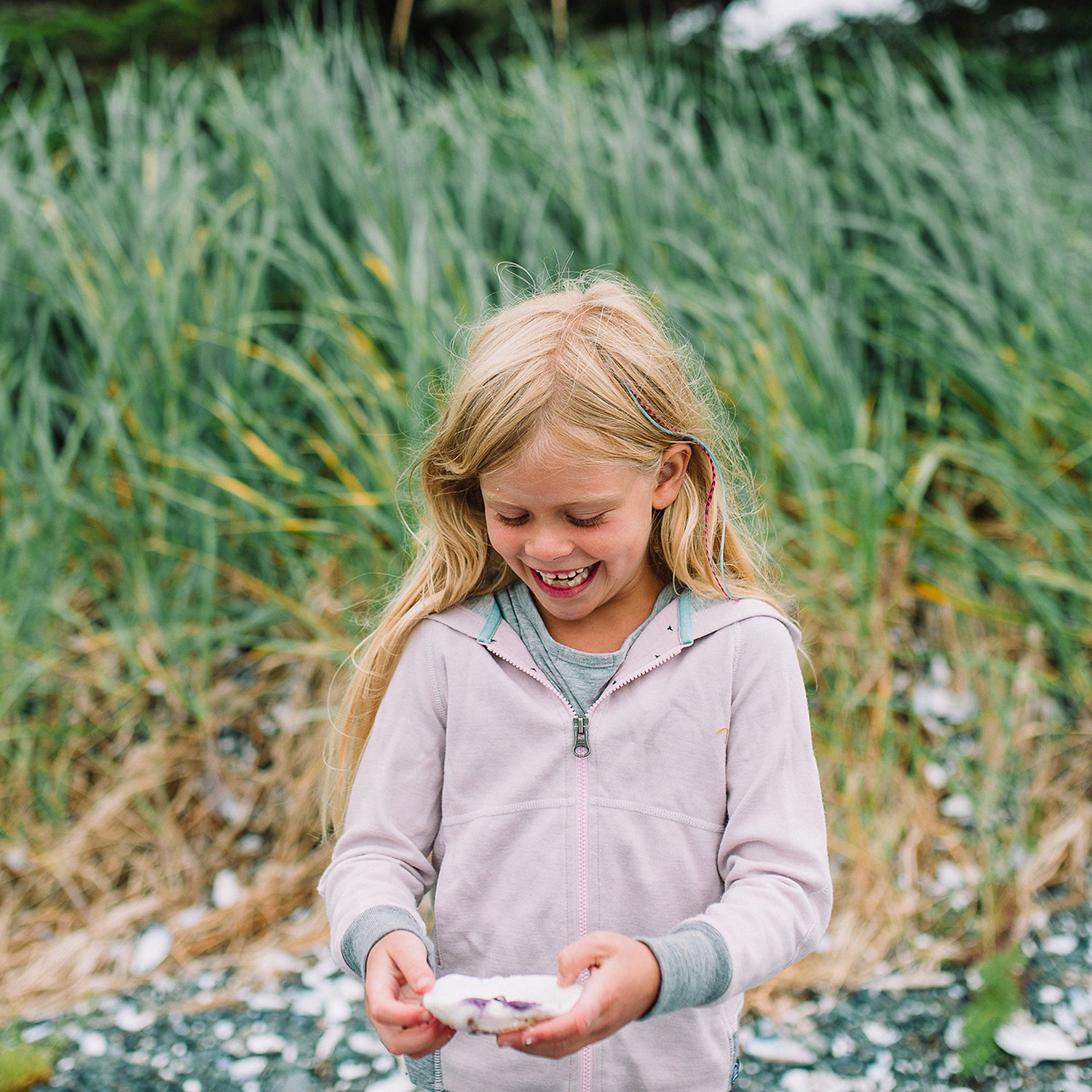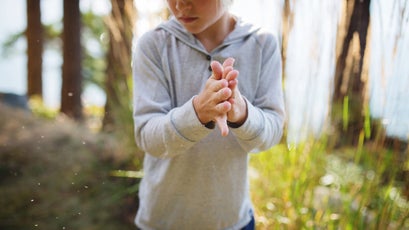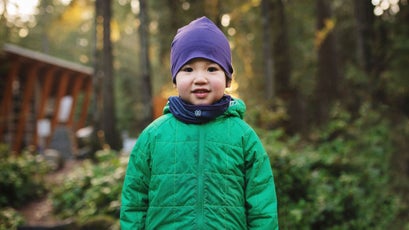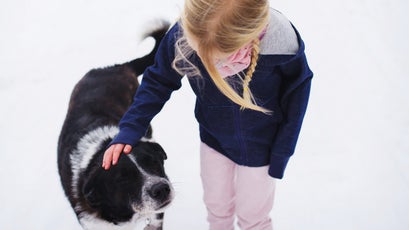Sometimes, when my daughters were babies, I’d get up for a middle-of-the-night feeding and be struck with what seemed like an absolutely genius idea. Said idea, product, invention, or scheme would liberate us from financial concerns, fill the college funds, and allow us the luxury of working from home and spending more time with our daughters! Why had no one else thought of this? I’d wonder as I stumbled back to bed, but by morning, the idea had fizzled in a haze of fatigue.
Not everyone succumbs to the brain fog. In 2014, Kevin Peacock and his wife, Giselle Murphy, were mired in the nitty-gritty of raising twin three-year-old daughters, Lela and Quinn, in Montreal, Quebec, when inspiration struck. Their kids were outgrowing the merino wool hand-me-downs their cousins had sent from Norway, and they couldn’t find a good source in North America. Why not make their own? Peacock left his job as an ad exec to launch , with $150,000 in funding from friends and family. Three years later, the company has seen annual sales grow by more than 50 percent each year and has become an enterprise with three employees and a network of savvy contractors. This year, Luvmother is making its first retail inroads in the United States, selling T-shirts, hoodies, pants, and more on . But it hasn’t all been smooth sailing. “This is the telling year,” says Peacock. “If we figure out our systems and things go well, next year I hope we’ll turn a profit.”
What does it take to leverage the ingenuity of parenthood into a successful startup? Patience, stamina, ingenuity, and a little bit of insanity—pretty much the same traits you need to survive parenthood.
OUTSIDE: What was the impetus for starting an outdoor brand?
KEVIN: I grew up in Montreal in a ski and biking family. I was a ski bum in Whistler for a couple seasons. After grad school, I got lucky and landed a job at a creative agency in Jackson, Wyoming. Now our family spends a lot of time stomping around the woods, skiing, and bike riding. Montreal has a beautiful mountain in the middle of it. You can trail run out the back door.
Why wool?
We have eight months of pure freezing nonsense up here in Montreal. When we had our kids, seven years ago, my sister-in-law sent hand-me-downs from Norway. The majority were merino wool. It’s standard issue there—comfortable, cozy, with no irritation. It does what it’s supposed to do: keep you cool when it’s hot and warm when it’s cold. When we needed to replace them, the offerings were super limited in North America and too expensive to import from Europe. None of the brands we’re fans of had any interesting offers for kids, and if they did, it was navy blue long johns, or it was just adult silhouettes and extra fabric that they shrunk down to kid size. Kids have different needs when it comes to gear.
Like what?
Some of it’s very simple. They grow much faster, so extra-long cuffs for shirts. Also, drop-down hems in the back, because kids are always bending over to play with things. More pockets for collecting stuff. Flatlock stitching and raglan sleeves that don’t chafe. You know how parents superimpose their own neuroses on their kids all the time—
No, I know nothing about that!
Well, parents say, “Oh, my kids would never wear wool. It’s too itchy.” But we source superfine merino, small gauge, that’s extra soft.
It seems like lots of startups are trying their hand at kids’ wool clothing. How is Luvmother different?
Other companies are locked into sleepwear and long johns. We’re doing crossover pieces: leggings that can work as ski long underwear, wool sweaters. We’re trying to answer the perennial question: How do I bring least amount of gear that will cover me in all situations? We want to encourage people to get out there and have fun, get dirty, and not think about their clothes.
What’s the secret to successful branding?
You need to have the root of a story, the genesis, for sure. Our company is very much a reflection of our lives. The story doesn’t have to be fantastical. It just has to be sincere and honest. It’s what we say about Luvmother: no muss, no fuss, and very matter of fact. We also try to take all of the good we see out there and put it into our business values: We’ve been offsetting our carbon footprints from shipments [from the factory in Portugal]. We use forest-certified paper as much as we can. We give our material scraps to a rug weaver in New York City as part of our Zero Waste Project. Eventually we hope to invite other companies to take part. Our new collection will be delivered in biodegradable bags. It costs a little bit more, but we think it’s worth it. There’s a strength to coming to it with some naïveté: What if we take 5 percent off our margins and apply that to buying better bags? We’ve taken a risk.
What are the downsides of running your own business?
We try to balance the work as much as possible. It comes in waves. We live walking distance from our daughters’ school, so often I can walk to school and then roll into the office with the dog at 9:30. But then I’m on my laptop half the night.
Yeah, that’s the little-known perk of parenthood: It forces you to become craftier with your time, to learn how to work in the cracks.
Yes, I’m totally working in the cracks. It helps that my girls are the best damn product testers I’ve ever met. They home in all the things I wouldn’t think of, like picking the length of the skirt or the size of a pocket or the way a seam is finished. They say, “When I was on the monkey bars, I felt that seam rubbing.”
What traits have served you well as a parentrepreneur?
You have to listen and learn, but at the same time keep hold of your vision, because that’s what makes your business unique from the get-go. I’ve been amazed by how generous people are with advice, sometimes people I hardly know. Do not being afraid to ask questions. Give yourself manageable expectations. I’m loving what we’re doing right now. I feel encouraged by repeat customers, but it has to work. I also have an end date—we have goals we have to reach.
What’s your long-term plan for Luvmother?
We currently make 15 to 20 pieces. My dream would never go too far out of that range, but to get to point where we have enough exposure that we have the volume to support that. It’s not chasing trends or selling out, but making something that is genuinely very good and having enough people know about it to support it.
What have been your biggest challenge as a mom-and-pop startup?
We’re always the small fish when we approach suppliers and factories, so we can have these great ideas but realize that we can’t fulfill the minimums. We’ve had to train our minds, know our strengths, and have realistic limits. When you work as part of established team, there’s always someone as backup if you get sick. But if we don’t show up, nobody shows up.
That’s a lot of pressure.
Yeah, but it’s incredibly rewarding too. You develop so many new skills. Now I’m a master of shipping grids, which is never something I aspired to. If we do fulfill our aspirations of growing the business and building a bigger team, I want to be able to understand what everyone has to do. Working this way forces you into a holistic understanding of a job.
Would you have started a kids’ clothing company if you weren’t a parent?
Me, personally, no. Having kids definitely flipped a different switch. Being a parent informs so much of what we do at the oddest hours of the day.







